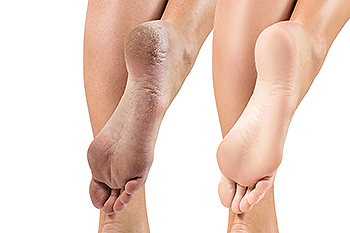
A lack of moisture in the skin of the feet may result in a condition known as cracked heels. It is often preceded by thickened skin on the heels which may become brown or yellow. Severely cracked heels are called fissures and may bleed or become infected. Cracked heels can develop for various reasons like standing on hard surfaces for most of the day and wearing shoes that have an open back. Additionally, there are medical conditions that can cause cracked heels, including dermatitis, psoriasis, and thyroid disorders. Relief may be found when the feet are soaked in warm water, followed by applying a good moisturizer. Some patients find that it may be helpful to use a pumice stone to effectively remove hardened skin. To avoid cracked heels, the best methods to implement consist of wearing closed, supportive shoes, and practicing everyday foot care. If you are afflicted with cracked heels, it is suggested that you consult with a podiatrist to determine the best treatment option for you.
Cracked heels are unsightly and can cause further damage to your shoes and feet. If you have any concerns, contact Gary Cockrell, DPM from Tennessee. Our doctor can provide the care you need to keep you pain-free and on your feet.
Cracked Heels
Cracked heels appear unappealing and can make it harder for you walk around in sandals. Aside from looking unpleasant, cracked heels can also tear stockings, socks, and wear out your shoes. There are several methods to help restore a cracked heel and prevent further damage.
How Do You Get Them?
Dry skin is the number one culprit in creating cracked heels. Many athletes, walkers, joggers, and even swimmers suffer from cracked heels. Age and skin oil production play a role to getting cracked heels as well.
Promote Healing
Over the counter medicines can help, especially for those that need instant relief or who suffer from chronic dry feet.
Wear Socks – Wearing socks with medicated creams helps lock in moisture.
Moisturizers – Applying both day and night will help alleviate dryness which causes cracking.
Pumice Stones – These exfoliate and remove dead skin, which allows for smoother moisturizer application and better absorption into the skin.
Change in Diet
Eating healthy with a well-balanced diet will give the skin a fresh and radiant look. Your body responds to the kinds of food you ingest. Omega-3 fatty acids and zinc supplements can also revitalize skin tissue.
Most importantly, seek professional help if unsure how to proceed in treating cracked heels. A podiatrist will help you with any questions or information needed.
If you have any questions, please feel free to contact our offices located in Brentwood and Madison, TN . We offer the newest diagnostic and treatment technologies for all your foot care needs.
